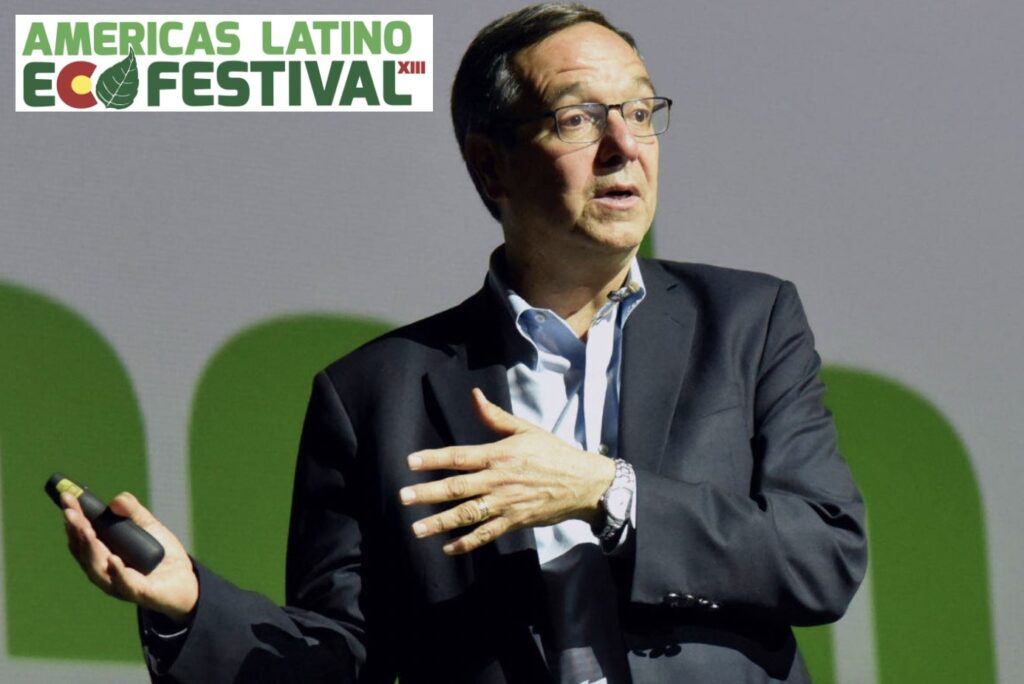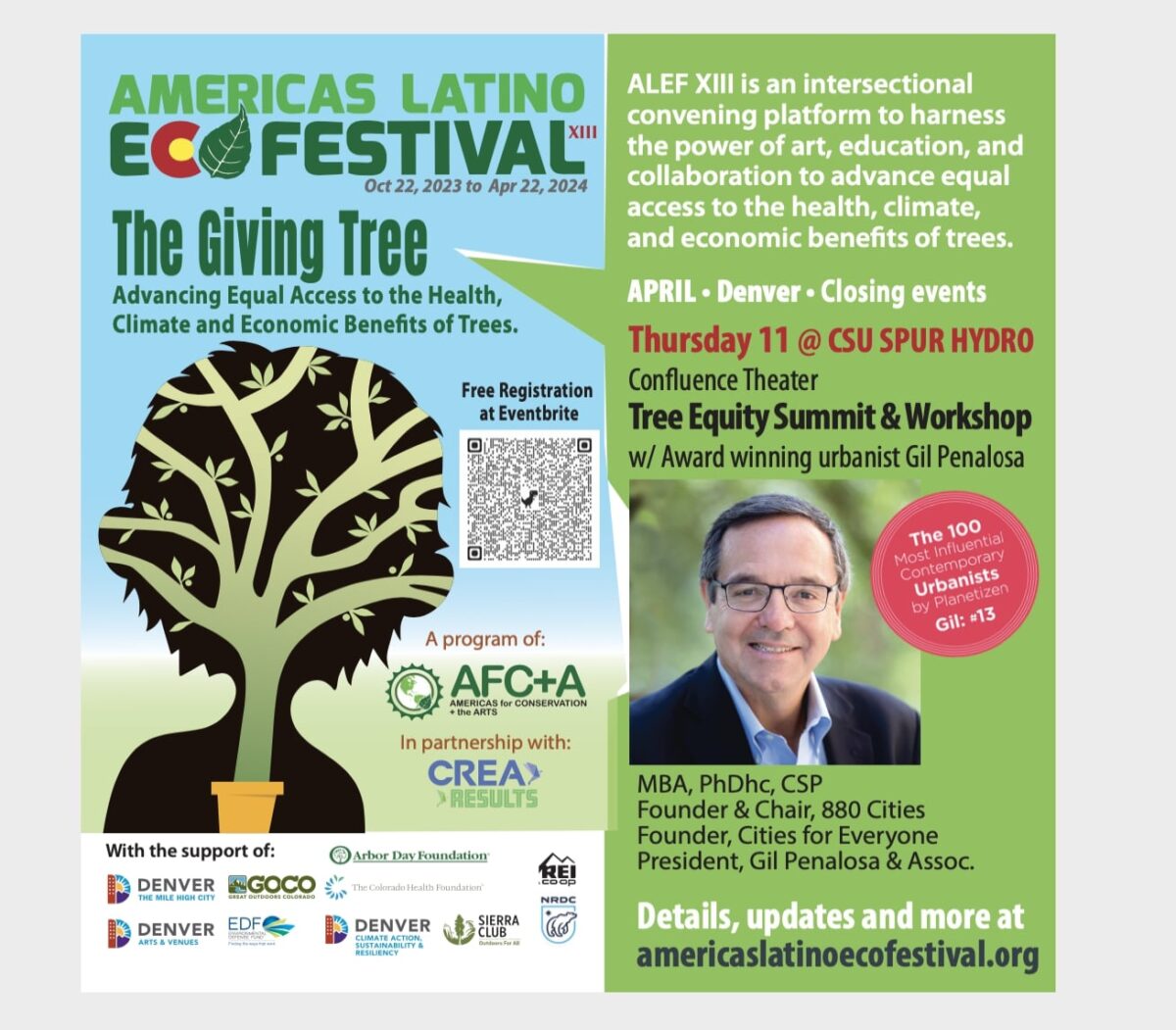
THE WORLD-RENOWNED URBANIST WILL BE PRESENT AT THE TREE EQUITY SUMMIT OF THE AMERICAS LATINO ECO FESTIVAL IN DENVER.
Newroom El Comercio de Colorado
Haga click aquí para leer la versión en español
In a revealing conversation with Jesús Sánchez Meleán, editor of El Comercio de Colorado, Guillermo Peñalosa, a recognized urbanist, emphasized the need to rethink the design of cities to prioritize the health and happiness of their inhabitants. Highlighting the positive impact of nature on mental and physical well-being, Peñalosa stressed the importance of integrating more green areas, parks, and trees into the urban environment.
Additionally, this prominent Colombian professional, based in Canada, emphasized equity in access to trees, pointing out the disparity between rich and poor neighborhoods regarding the presence of tree-lined areas. Drawing from his extensive experience in urban planning in over 350 cities worldwide, Peñalosa will provide concrete recommendations to transform Denver into a more friendly, sustainable, and equitable city.
Conversation with Denver’s Mayor
As part of the Tree Equity Summit program of the Americas Latino Eco Festival (ALEF), Peñalosa will engage in a conversation with Mike Johnston, Mayor of Denver. This expert aims to share his knowledge and insights with Mayor Johnston and with scientists, writers, artists, policymakers, municipal officials, representatives of the philanthropic sector, youth, and community leaders attending the ALEF.
“Every city is different; even within Denver, each neighborhood and street is unique. But the experiences we have seen and learned from serve us to avoid what does not work and to do what does work,” said Peñalosa. This expert believes that with the popularization of the car, the concept of a city where one could live, and work was destroyed. “We must create cities where people can walk and have trees,” he concluded.
Read the interview and register.
Register

Americas Latino Eco Festival – Tree Equity Summit and Workshop
April 11th
8:30 a.m. to 4:30 p.m.
CSU Spur
4777 National Western Drive
Denver, CO 80216
Interview with Guillermo Peñalosa, urbanist and CEO of 8-80 Cities
Jesús Sánchez Meleán: We are talking with a very special guest, Guillermo Peñalosa. Everyone knows him as Gil Peñalosa. He is Colombian. Many Colombians will remember him because he was the director of parks in the city of Bogotá and was very involved with the idea of the “Ciclovia” [Open Streets]. He is one of the 100 most influential contemporary urbanists in the world, ranking number 13 in that list of experts.
Peñalosa is also one of the most influential people in the world in the development of sustainable cities. He will be in Denver for the Tree Equity Summit to be held in Denver on the occasion of the thirteenth edition of the Americas Latino Eco Festival. I must start by asking you, not a strong question, in terms of baseball.
Are you still optimistic about what cities can contribute to people in terms of health and happiness? Or do we have to grab a suitcase and go live far away? Are you? Are you still optimistic about what the city can bring us?
Gil Peñalosa: Well, I am very optimistic about what cities can contribute, but I am also very realistic that we must make cities radically different from what we have been doing in the last 50 years. When we see the cities we have made in the last 50 years, most of them are not good. And when I say they are not good, it’s because they are not good for sustainable mobility, for walking, for cycling.
They are not good because they do not have enough trees, enough parks, or nature. The air quality is not good. The noise level is too high, so they are not good for mental and physical health. They are not good for the environment, not even for economic development. However, it is very clear what we have to do. This is not a technical problem or a financial problem. It is more of a political problem, but not a partisan one.
There must be unity around this issue because this is not just about Republicans or Democrats or Independents, but we do need to have a city where we can all live happier and healthier. Children, adults, the elderly, everyone.
JSM: You will be sitting here in Denver on April 11th, in front of the mayor of Denver, in a conversation within the summit. You will be able to explain the experience you have had advising some 350 cities around the world.
What will be your main recommendation for the mayor of Denver, with the idea that this city becomes a pleasant, friendly city from the point of view of health and the environment?
GP: One must have a clear vision of the type of Denver one has and wants to make. I will tell you that it must be consistent between what one thinks, what one says, and what one does. Because sometimes one hears mayors talking about planting so many hundreds of thousands of trees and there will be so many parks, and in the end, they don’t do them. So you have to be consistent.
Second, one must focus on the most vulnerable citizens, who are children, the elderly, the poor, people with disabilities. I think the issue of equity is extremely important and obviously, the issue of sustainability is very important. We see the anxieties of climate change, and these are things we must do.
So, for example, in terms of mobility, we cannot continue to do everything based on the private car because it requires a lot of space and streets and pollution where it will be terrible for the environment. I think one should focus on the proximity of all citizens in Denver. That they can have all their activities within walking distance.
So, this is called “The 15-minute City” in many places. Others call it the 20-minute city. Well, I call it proximity, you have to have proximity. So I believe in those kinds of things, then focusing on the most vulnerable, on equity, on sustainability, and on proximity.
Gil Peñalosa: “The Lack of Equity in Green Spaces is Unacceptable”
JSM: Indicate one thing that cities, or planners, or urbanists, should not continue to repeat. Or, in other words, what has been the big mistake made in that recent development that you speak of in cities around the world?
GP: Well, in the last 80 to 100 years, we have been making cities thinking more about cars than about people’s happiness. Before 100 years ago, all cities were cities of 15-minute proximity. But the car came, and we messed up the cities. We built highways in the middle of all neighborhoods, and people moved to the outskirts and became dependent on the car.
We must somehow reverse this and generate density where people are living. Denver has a wonderful opportunity because the population is growing. So. But hopefully, all population growth will be in the existing city, in the existing urban area, so it doesn’t continue to sprawl outward, because otherwise, it will never be sustainable.
But take advantage of the fact that people are coming to generate density. And when I say density, it doesn’t have to be 50-story buildings. We achieve the same density with a building of five stories next to each other as with 50 every two blocks, and it is much more human and pleasant to live in cities with lower buildings.
So those kinds of things can be done. But we also have to consider that there is an urgency to make these kinds of cities.
Gil Peñalosa: “The Lack of Equity in Green Spaces is Unacceptable”
JSM: A Bogotano living in Canada or in Toronto, what do you miss about your homeland, a Bogotano living in Canada? What does Peñalosa miss every day?
GP: There are two things I miss. One, the ciclovia. The ciclovia. It’s what we call “Open Streets” in the United States and Canada, which is basically recreational on Sundays. When I worked with the mayor of Bogotá and found a very small program, a few miles and a few thousand people. When I finished, we had more than 75 miles and more than 1 million people every Sunday and holidays. I love that.
And I think any city in Colorado or any city in the world can do this. It works in cities of 100,000 people, 1 million, 10 million. Basically, people on Sundays create an urban grid where people can walk, bike, run, play, shop, enjoy people, meet as equals. I miss that. I also miss that Bogotá has beautiful mountains, and Toronto is quite flat.
There are no mountains around, but that’s why I love going to Denver and Boulder because you do have many mountains, and you have to enjoy that mountain theme. So there are some things that one misses. On the other hand, in Canada, I have had the opportunity to create a non-profit organization called 8 80 Cities and also to work in more than 350 cities on all continents of the world, in small, large, rich, poor cities.
The issue of the 8 80 Cities organization is based on a simple but very powerful concept. What if everything we did in cities, the sidewalk, the street crossings, the parks, the libraries, the restaurants, the buildings, everything had to be excellent for an eight-year-old child or an 80-year-old adult, not from 8 to 80, but eight and 80 as an indicator because if it’s good for the eight-year-old and the 80-year-old, it will be good for everyone. From zero to over 100 years old. We have to stop building cities as if everyone were 30 years old and an athlete and build cities for everyone.
Gil Peñalosa: “The Lack of Equity in Green Spaces is Unacceptable”
JSM: Eh? Do you drink “tintico” [Colombian coffee] every day?
GP: I drink a lot of coffee during the day to stay energetic. And even when we had the pandemic, the pandemic was awful for everyone. But at the same time, it brought some positive things, like the issue of mental health. It came out of the closet; people were embarrassed to talk about mental health. And speaking of trees, we are going to talk about trees in Denver this week. We also found that when we go out into nature, to parks, mountains, trails, it helps to calm anxiety, depression.
So there was a direct relationship found between nature and mental health, and I think that was a very positive thing. I think we have to start seeing trees and nature with different eyes, with eyes that beautify our city. But it’s not just an aesthetic issue, but it also helps with mental health, helps the environment because when there are very heavy rains, they absorb that water, clean, purify the air.
So, one of the reasons why we must have trees everywhere, and it is one of the issues I mentioned: equity. In general, when you fly over cities, you can look, almost know where the rich people live and where the poor people live because the neighborhoods where the rich live usually have many trees. There is a very high coverage of 40 to 50% or more. Where the poor live, there are very few trees, and it is completely unacceptable to have a lack of equity in trees, green space, parks.
JSM: Well, you’ve heard it. One of the most influential people in the world in the area of urban planning will be in Denver, will be talking about trees at this summit. He has already practically given us the title of this conversation that we have to see trees with another perspective, not only from the beautification point of view, but their impact on health. Dr. Peñalosa, thank you very much. We hope to shake your hand in person, and you fill us Latinos with pride because you are doing, let’s say, a worldwide apostolate, speaking and doing, saying how cities can improve to make us happier and healthier. And you are a Latin American who speaks and who has in his heart that mountainous and vegetated Bogotá. And we are sure that you are projecting that because it is part of your reason for being. Thank you very much, and we will see you here in Denver on April 11th.
GP: Thank you very much, Jesús, I look forward to seeing you next week, and hopefully, many of those listening will register because there are many people invited to share experiences from many places, and it’s good to hear experiences from others, not like on computers where we copy and paste. No, it’s not for copying. Every city is different, but even within Denver, each neighborhood is different, each street. But experiences serve us to avoid what doesn’t work and to do what does work. Thank you very much, Jesús, for this opportunity.

You may also like:
Celebrating the Tree Equity Summit in Denver






otras noticias
Digital Calendar – May 2024
COVID-19 Affected Individuals Live with its Effects
The gorillas of AMLO